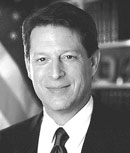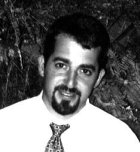 New
biography alleges Gore used marijuana regularly for years New
biography alleges Gore used marijuana regularly for years
Newsweek killed story at last minute
 The
Week Online with DRCNet has learned that Newsweek Magazine
decided late Friday (2/4/2000) to postpone publication of an
excerpt of a Gore biography featuring eyewitness accounts of
Al Gore's regular and continued drug use over a period of years.
The drug use covers a period of Gore's life from his days at
Harvard up until the very week he declared his candidacy for
Congress in 1976, sources told The Week Online. The
Week Online with DRCNet has learned that Newsweek Magazine
decided late Friday (2/4/2000) to postpone publication of an
excerpt of a Gore biography featuring eyewitness accounts of
Al Gore's regular and continued drug use over a period of years.
The drug use covers a period of Gore's life from his days at
Harvard up until the very week he declared his candidacy for
Congress in 1976, sources told The Week Online.
The book, by Bill Turque of Newsweek's Washington bureau,
quotes both named and unnamed sources including John Warnecke,
son of John Carl Warnecke - architect of the John F. Kennedy
grave site, and a long-time friend of the Gores. An exclusive
interview with Mr. Warnecke follows this story.
The excerpt had been scheduled to run in Newsweek's January
18th issue, just days before the start of the Democratic primaries.
A previous excerpt from the book appeared in the December 6th
issue. In that excerpt, which covered Gore's Vietnam experience,
Tipper Gore was said to have spent considerable time distraught
with worry for her husband's safety at Warnecke's house while
Gore was overseas.
The Gore biography, to be published by Houghton-Mifflin, was
itself originally scheduled for a January release, but that,
too, has been delayed until March 23rd. A spokesman for Houghton-Mifflin
told The Week Online that the delay was "normal."
Al Gore has previously admitted using marijuana, but those
admissions fall well short of the type of regular, chronic use
described by Warnecke. Warnecke also says that Gore used marijuana
regularly for at least four years after the Vice-President claims
to have stopped.
On November 7, 1987, in the wake of Douglas H. Ginsburg's
failed Supreme Court nomination, Gore told the Bergen County
Record that he had smoked marijuana in college and in the army
but had not used it in the past fifteen years. The New York Times
reported on November 8, 1987:
Mr. Gore said he last used marijuana when he was twenty-four.
He said he first tried the drug at the end of his junior year
at Harvard and used it again at the beginning of his senior year
the next fall. He also said he used the drug "once or twice"
while off-duty in an Army tour at Bien Hoa, Vietnam, on several
occasions while he was in graduate school at Vanderbilt University,
and when he was an employee of a Nashville newspaper (The Nashville
Tennessean). On November 11, 1987, Gore was quoted in UPI, saying
"We have to be honest and candid and open in dealing with
the (drug) problem."
Mr. Turque refused to comment to The Week Online. Roy Burnett,
a spokesman for Newsweek, acknowledged that the magazine was
preparing to run a new excerpt from the book "in the coming
weeks." Asked whether there in fact had been a delay, and
if so, the reasons behind it, Burnett would say only that it
is Newsweek's policy not to discuss its editorial practices.
Gore, as vice-president in the Clinton Administration, has
presided over a drug war policy which has led to the arrest and
incarceration of record-breaking numbers of nonviolent drug-law
violators. In 1998, according to the Justice Department, there
were 682,885 Americans arrested on marijuana charges, 88% of
whom were arrested for possession. A recent study by the Center
on Juvenile and Criminal Justice (www.cjcj.org) reported that
the incarcerated population of the U.S. would reach two million
on or around February 15, 2000.
Of those many thousands, more than half are nonviolent, drug-law
violators, according to CJCJ.
On February 8, 1999 Vice President Gore personally presented
the administration's Drug Control Strategy at a Washington, DC
press conference. During his remarks, Gore spoke about the "spiritual
problem" of drug abuse and about the need for more positive
opportunities for young people. Despite this lofty rhetoric,
however, the administration's strategy allocates approximately
two-thirds of the federal drug budget on enforcement, with less
than one-third to be spent on treatment and education combined.
At that press conference Gore, perhaps inadvertently, pointed
out the very problem inherent in a class of political leaders
who prosecute a failing drug war while hiding their own experiences
with illicit drugs, and ignoring the message which that deception
sends to young people.
"And if young people feel there's phoniness and hypocrisy
and corruption and immorality," Gore said, "then they
are much more vulnerable to the drug dealers, to the peers who
tempt them with messages that are part of a larger entity of
evil."
 INTERVIEW
with John C. Warnecke INTERVIEW
with John C. Warnecke
Exclusive to The Week Online
By Adam J. Smith
John C. Warnecke worked as a reporter for the Nashville Tennessean
and was a close personal friend of the Gores. Warnecke is the
son of John Carl Warnecke, architect for the John F. Kennedy
gravesite. The Week Online spoke with Mr. Warnecke by phone this
week.
The Week Online: Mr. Warnecke, Vice President Gore
has said that he used marijuana 'on several occasions' and 'not
since he was twenty-four.' But you say that you have first-hand
knowledge that his use was more extensive than he has previously
admitted?
John C. Warnecke: Yes, I do. I have first hand knowledge
that he has not told the truth about his drug use. Al Gore and
I smoked regularly, as buddies. Marijuana, hash. I was his regular
supplier. I didn't deal dope, I just gave it to him. We smoked
more than once, more than a few times; we smoked a lot. We smoked
in his car, in his house, we smoked in his parents' house, in
my house; we smoked on weekends. We smoked a lot.
Al Gore and I were smoking marijuana together right up to
the time that he ran for Congress in 1976. Right up through the
week he declared for that race, in fact.
WOL: And after that?
JCW: After that he began to distance himself from me.
I was bad for his political career.
WOL: During the course of the 1988 campaign, you told
the New York Times and the Nashville Tennessean that you had
smoked marijuana with Al Gore
JCW: A few times. And I told them that he didn't like
it.
WOL: Why didn't you tell the truth at that time?
JCW: I was put under a lot of pressure to lie.
WOL: Who was pressuring you?
JCW: The answer to that question is in the excerpt
that Newsweek decided not to run. It's in the Turque book. Right
now, I'm going to leave it at that.
WOL: So what made you decide to come forward now?
JCW: It's because I've been under a lot of stress.
My conscience has been killing me ever since then. I actually
came forward months ago when Bill (Turque) interviewed me for
the book. I had been told that this story would come out, that
the public would know this by now. But then the book date was
pushed back, and Newsweek pulled the story. The only thing that
I can assume is that Newsweek is covering this up, protecting
the Gore campaign by refusing to run this before the primaries.
I decided that I had to go ahead and tell it. I really feel that
the public has a right to know this at this time, and I was having
trouble living with myself being part of the hypocrisy and the
lies.
WOL: Hypocrisy?
JCW: Yes. The drug laws in this country are ruining
the lives of hundreds of thousands of young people, mostly poor
young people, people who don't come from privileged backgrounds
and wealthy families. It just doesn't make sense that we have
a war on drugs. It doesn't work, and the politicians refuse to
talk about it. That suffering and that hypocrisy have weighed
very heavily on my conscience. I have a saying that I use, and
that is: "who raised you?" In other words, were you
raised with a conscience? Mine has made my life very difficult
ever since I became part of the hypocrisy. I couldn't live with
the lie anymore. Not and stay sober.
WOL: How long have you been sober?
JCW: Twenty-one years.
WOL: Congratulations. So, after twenty-one years of
sobriety, do you consider Al Gore a criminal for his drug use?
JCW: I don't consider drug use a criminal act. Is drug
use a poor choice? Yes. Is it risky behavior? Yes. Does it make
any sense - has it gotten us anywhere as a society to criminalize
it? Absolutely not, unless you consider it progress that we're
spending more on prisons than on higher education, and still
the drugs are everywhere. But politicians refuse to talk about
this issue honestly.
WOL: And what would you have Al Gore say about it?
JCW: I wish Al would come clean. I wish that all politicians
would come clean and deal with this in a rational manner. Look
at all the damage the silence is causing.
WOL: And Newsweek?
JCW: Newsweek cut off information that the American
people should have had in order to make an informed decision.
Knowing that Al Gore used drugs considerably more than he has
admitted is important. Let the American people draw their own
conclusions about it; let them decide how important it is.
We need to quit lying about it. Quit hiding it. To my mind,
Newsweek censored this; they covered it up. And I think that
the perpetuation of that silence over time has allowed us to
go on jailing kids. Kids who are much younger and less equipped
to deal with life than Al Gore was when we were using drugs together.
I want any candidate that is running for president to be honest
about their drug use. And then we can start being honest with
ourselves about how best to deal with society's drug problem.
WOL: So you don't think that his past drug use, even
his extensive drug use, should disqualify Al Gore from the nomination?
JCW: I'm going to vote for Al Gore.
(Ed. note: After DRCNet broke the story,
Newsweek ran it in a later issue.)
DRCNet · 2000 P Street NW Suite
615
WA DC 20036 · 202-362-0030 fx 362-0032
www.drcnet.org

|

